Yu Shan, a Senior Technical Expert at Alibaba Cloud, shared his topic on "Agile Smart Connection - Blockchain Business Innovation Based on Container Technology at the 2017 Computing Conference ¨C Beijing Summit. He introduced the technical advantages of Alibaba Cloud blockchain in terms of Alibaba Cloud Container Service and blockchain project solutions.
The following content is sourced from his presentations at the 2017 Computing Conference ¨C Beijing Summit.
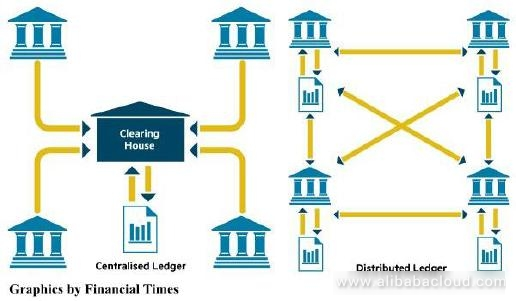
The blockchain technology is a distributed shared ledger technology, which is mainly used for Internet databases. With this technology, trading parties share data with regulators over blockchain networks. Each party has a ledger. Once a transaction is confirmed and agreed upon by all parties and written in the ledger, the ledger cannot be altered. The transaction history can be traced back. Transaction information and identities of trading parties are protected as private information. Transactions are automatically implemented through smart contracts.
Blockchain can be classified into public chain, private chain, and alliance chain. Key technologies involve consensus algorithm, cryptology, and distributed architecture. The blockchain technology can solve the trust problem and make for decentralized/multi-center architectures.
Hyperledger Fabric belongs to Linux Foundation. It is the most influential subproject under the Hyperledger project and the most influential basic architecture for blockchain. Based on Apache License v2, the project is programmed using the Go language. Chaincode can be developed using the Go language and will be developed using the Node.js language. Client SDKs currently support the Node.js and Java languages and will support the Python and Go languages. The project was established on December 17, 2015. Version 0.6.0 (developer preview version) was released on September 16, 2016, version 1.0.0 (golden master) was released on July 11, 2017, and version 1.1.0 will be released in the first quarter of 2018.
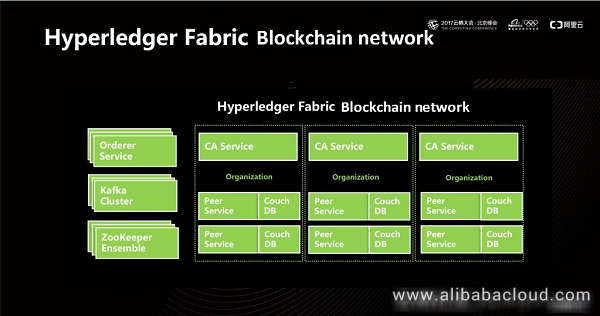
Consumer process information is collected through Kafka clusters over Hyperledger Fabric-based blockchain networks, and producer process information is collected through Zookeeper Ensemble. The information is managed by Orderer Service. All parties enjoy equal service and collect transaction information. Trading parties share data with regulators over blockchain networks. Each party has a ledger.
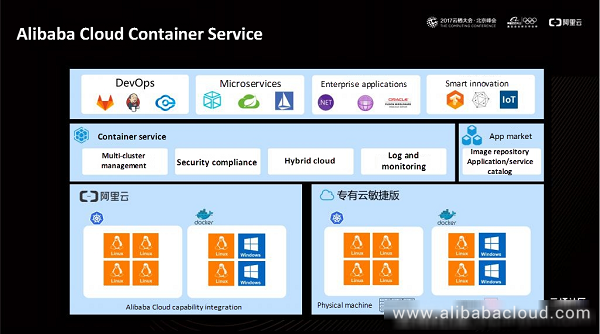
Alibaba Cloud Container Service is built based on DevOps (integrated management), microservices, enterprise application, and smart innovation. Container Service involves multi-cluster management, security compliance, hybrid cloud, and log monitoring technologies.
In terms of the App market, image repository and application/service catalog are applied. On Alibaba Cloud servers, Kubernetes function components work through Linux clusters. In terms of Docker containers, the Linux operation system is compatible with the Windows operation system. In terms of Virtual Private Cloud (VPC) agile servers, the Linux cluster memory service is enabled on physical machines, and the Linux operation system is compatible with the Windows operation system on virtual machines.
Alibaba Cloud Container Service Docker + K8S technology implementation Kubernetes function components are in Kubernetes v1.8.1 and will be upgraded to v1.8.4. Alibaba Cloud Kubernetes management service uses Helm/Docker Compose for application orchestration and expansion and uses log and overhead gated release for container application O&M. Service catalogs are displayed as application catalogs. Multi-cluster management, cluster lifecycle management (upgrade and scale-up/down), hybrid cloud management (federation of local and cloud clusters supported), security compliance (RAM, Action Trail, and KMS), and container security (during image service and running) technologies are applied and implemented.
K8S clusters are processed through nodes in control mode. On each of Docker, Containerd, and Windows Container nodes, data is collected by Kubelet components, network plug-ins, log plug-ins, overhead plug-ins, and two App terminals. In terms of Kubernetes cluster control, storage volumes are managed, Server Load Balancer, auto scaling, and cluster federation are supported, and applications are expanded based on gated release, service dependency processing, and legacy environment compatibility.
Blockchain business innovation is faced with enormous challenges: deep understanding of underlying blockchain technologies are required; configuration and deployment are complex and time-consuming; secondary development is difficult with a steep curve of learning platform technologies and reduced iteration speed; a variety of basic resources and services are required for blockchain so that it is difficult to integrate and control investment and quality of them; the deployment platform and environment are not secure enough without enterprise-level security control and risk prevention capabilities; the service quality cannot reach the production level, and the O&M process and methods are immature and inconsistent.
The Alibaba Cloud server blockchain solution has the following advantages: a graphical wizard simplifying configuration and enabling automatic one-click deployment, which saves time and efforts; container cluster technologies based on the most mainstream Kubernetes and Swarm, natively supporting Hyperledger Fabric and accelerating blockchain business development; diverse powerful basic resources and services provided by Alibaba Cloud, seamlessly integrating the blockchain technology and improving cost effectiveness; a reliable and secure cloud platform with multi-dimensional security management and risk prevention capabilities; diverse powerful and intuitive monitoring, log, and O&M services, ensuring stable running of the platform and applications in one-stop mode.
The Blockchain Solution of Alibaba Cloud Container Service is applied in the following scenarios: asset securitization, letter of credit, asset custodian, global logistics and shipping, food and drug safety and tracing, medical insurance, and charity. Hyperledger Fabric implements open source mainstream blockchain for enterprises. It is developed, deployed, and run based on the container technology. Kubernetes and Docker swarm mode are supported. Hyperledger Fabric is used for development, test, education, and training of blockchain applications and solutions, and for commercial popularization of cloud blockchain.
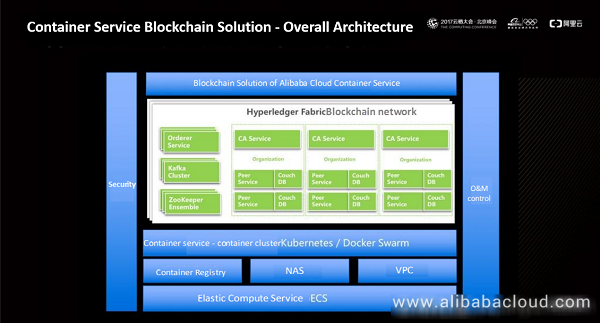
The preceding figure shows the overall architecture of the solution for container without blockchain. With Alibaba Cloud's technology and server, the system can process data in batches at an enterprise level.

On the GUI, clusters are configured over blockchain networks, and blockchain networks are deployed in one-click mode. The system supports CLI, SDK, and App coordinated commissioning as well as Hyperledger Fabric Explorer monitoring.

Kubernetes clusters are based on the container service Kubernetes application catalog and released in chart form. On the GUI, blockchain networks are specified and deployed to Kubernetes clusters in one-click mode. Different blockchain networks are isolated by namespace. The system supports CLI, SDK, and App coordinated commissioning as well as Hyperledger Fabric Explorer monitoring.
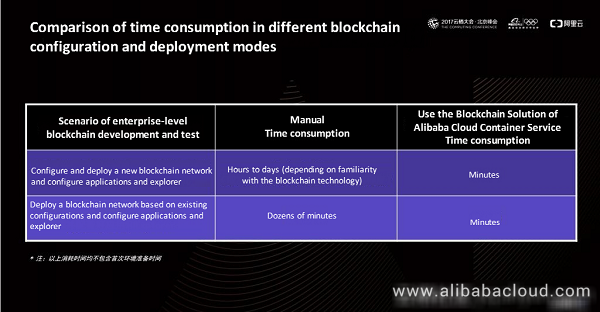
Alibaba Cloud saves a lot of time in blockchain configuration and deployment.
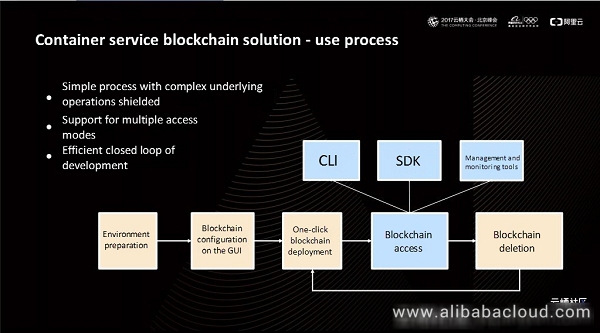
By using the Alibaba Cloud blockchain technology in a prepared environment, on the GUI, you can configure blockchain, deploy blockchain in one-click mode, access blockchain in multiple ways, or delete blockchain. The process is simplified, blockchain can be accessed in multiple ways, and an efficient closed loop of development is formed.
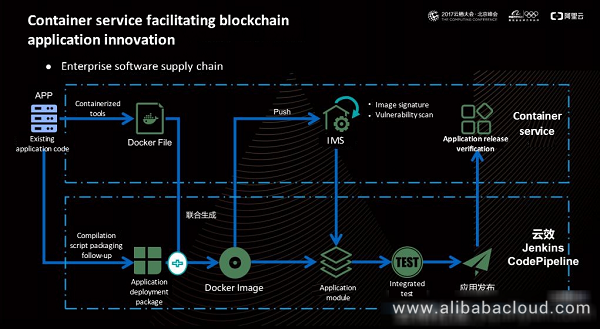
Container service facilitates blockchain application innovation through image vulnerability scan, enterprise software supply chain, Kubernetes application deployment, and application repository.
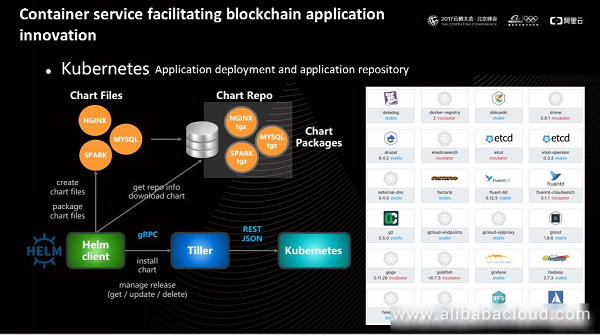
Alibaba Cloud Container Service allows you to build blockchain applicationss through clusters, nodes, images, and application catalogs. With Container Service, you can also deploy multiple clusters to handle enterprise-level issues. To read more about Alibaba Cloud's recent developments in blockchain and container technologies, visit www.alibabacloud.com/blog.
Catch the Finals of the 2018 Global Blockchain Competition at Alibaba Cloud Computing Conference

15 posts | 8 followers
FollowAlibaba BlockChain Service Team - August 29, 2018
Alibaba Cloud Blockchain Service Team - September 6, 2018
Alibaba Clouder - December 4, 2018
Alibaba BlockChain Service Team - September 6, 2018
Alibaba Cloud Blockchain Service Team - August 29, 2018
Alibaba Clouder - November 6, 2019

15 posts | 8 followers
Follow LedgerDB
LedgerDB
A ledger database that provides powerful data audit capabilities.
Learn More Blockchain as a Service
Blockchain as a Service
BaaS provides an enterprise-level platform service based on leading blockchain technologies, which helps you build a trusted cloud infrastructure.
Learn More ACK One
ACK One
Provides a control plane to allow users to manage Kubernetes clusters that run based on different infrastructure resources
Learn More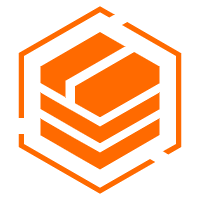 Container Registry
Container Registry
A secure image hosting platform providing containerized image lifecycle management
Learn MoreMore Posts by Alibaba Cloud Blockchain Service Team
Raja_KT February 19, 2019 at 6:14 am
Blockchain is better used on Cloud for n number of reasons.